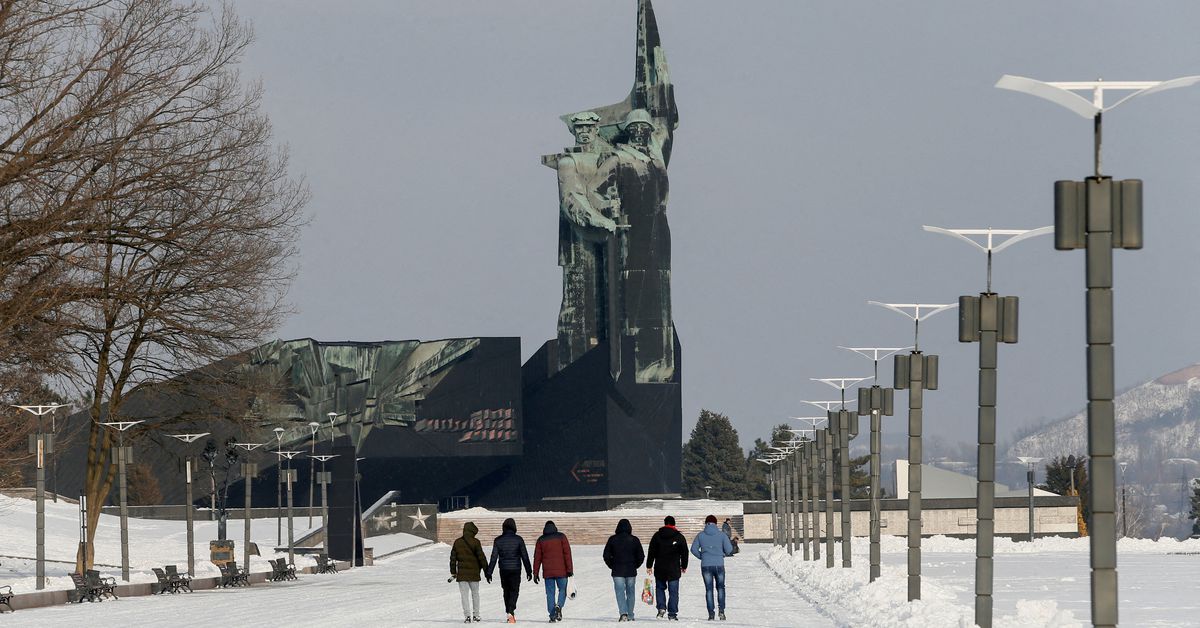Separatist rhetoric, ‘false-flag operation’ fears stoke Ukraine tensions

Summary Mutual recriminations increase over eastern Ukraine
West concerned by possible ‘flase-flag operations’
Russia denies seeking pretext to attack
MOSCOW, Feb 19 (Reuters) – Pro-Russian separatists said on Saturday they had uncovered a plan by Kyiv to seize territory they control in eastern Ukraine by force, and paraded a man they said was a Ukrainian spy.
Authorities in the Ukrainian capital quickly dismissed the alleged plan as a fake and have shrugged off spy allegations in the past, but such reports are contributing to a rise in tension.
Fears are growing in Kyiv and the West that a false-flag operation – an act committed with the intent of pinning blame on another party – could be staged in eastern Ukraine and used as a pretext for Russia to attack. read more
Register now for FREE unlimited access to Reuters.com Register
Russia, which has massed forces near Ukraine, has denied plans to invade and dismissed talk of false-flag operations.
But it has said it is alarmed by the situation and separatist authorities in eastern Ukraine began a mass evacuation on Friday, citing fears of a Ukrainian offensive.
The Ukrainian authorities deny planning any kind of assault, and fear that attempts to create a pretext for a Russian invasion are growing.
On Saturday, separatists in the self-proclaimed Donetsk People’s Republic said they had intercepted a plan to “purge” of the pro-Russian region of Russian speakers as part of a five-day operation to take the region by force.
In an interview broadcast on Russia’s state Channel One television channel, a man whom the separatists said they had detained in the city of Donetsk said he had helped Ukraine blow up a separatist commander’s jeep the night before and that he had smuggled weapons and explosives.
“I was recruited in 2018,” he was shown saying.
He said his handler had told him to steer clear of tall apartment blocks in the city of Donetsk because it would be targeted by artillery and he risked being killed.
People walk towards a monument to the Liberators of Donbass in the rebel-held city of Donetsk, Ukraine January 27, 2022. REUTERS/Alexander Ermochenko
‘HOSTILE AND INFLAMMATORY’
Russian-backed rebels seized a swathe of eastern Ukraine and Russia annexed Crimea in 2014 after protests toppled Ukraine’s pro-Russian leader. Kyiv says more than 14,000 people have been killed in the conflict in the east.
In the breakaway Luhansk region, local authorities said on Saturday a vehicle stuffed with explosives had been found parked on a road being used to evacuate people to Russia.
Authorities in the region also said explosions had torn through a local gas pipeline and a petrol station the previous night and described them as acts of sabotage which they suspected Ukraine was behind.
In other incidents on Saturday, Russia’s FSB security service said two shells landed on Russian territory near the border, Russia’s Tass news agency reported. One hit a building in Rostov region but no one was hurt, it said.
Ukraine’s military accused Russia of faking pictures of shells to make out they were Ukrainian, and said mercenaries had arrived in separatist-held eastern Ukraine to stage provocations in collaboration with Russian special forces.
Helga Schmid, the secretary general of the Organization for Security and Co-operation in Europe (OSCE) security watchdog, and Polish Foreign Minister Zbigniew Rau expressed concern about the growing rhetoric on Friday.
“We deplore the spreading of disinformation about an imminent military action by Ukrainian government forces; this critically affects the civilian population in the conflict zone,” they said in a joint statement.
“The increasingly hostile and inflammatory rhetoric we have been hearing recently undermines efforts to foster peace, stability and security and increases the risks of further confrontation and escalation. It must stop.”
Moscow expressed surprise at the statement and questioned the impartiality of the OSCE.
Register now for FREE unlimited access to Reuters.com Register
Reporting by Tom Balmforth and Maria Kiselyova; editing by Timothy Heritage
Our Standards: The Thomson Reuters Trust Principles.






